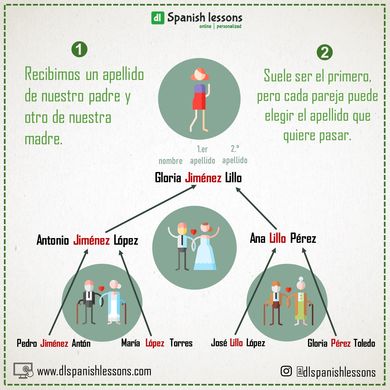✎ Includes a video lesson at the end of this entry
PODCAST: read and listen to this entry at the same time (you can find the Spanish text here)
Did you ever notice that Spanish names consist of more words than in other cultures? Well, this isn’t because of the (1) proper name or the (2) double names, but due to our (3) surnames.
Double/compound name: name consisting of two or more words. Gloria María Maria José Jose Antonio
How are the names being formed?
As you can see in the example of our fictitious family on the picture below, names consist of the proper name and two surnames. The daughter is called:
Gloria (proper name) + Jiménez (first surname) + Lillo (second surname).
The proper name can be a simple one like for example Gloria, or a compound name as in Gloria Antonia. If you add the two surnames to a double name (Gloria Antonia Jiménez Lillo), then the resulting name is one of those very long names that surprise a lot of my students.
Now, let’s form the complete name

Let’s have a look at where those two surnames come from. First, the parents choose the proper name they want to give to their children. This name can be a single name or a compound name. Here you see a single female name:
Gloria
This is the proper name we’re going to use. Now, Gloria needs two surnames: one from dad and the other from mom. The father of Gloria is called Antonio Jiménez López. He chooses to pass his first surname, Jiménez, to his daughter. Like this, Gloria becomes:
Gloria Jiménez
But things don’t end here. No it’s the turn of the mom of Gloria. She’s called Ana Lillo Pérez, and she chooses to pass her first surname to her daughter as well. Therefore, the complete name of her daughter is now:
Gloria Jiménez Lillo
This means, it consists of name + first surname + second surname.
Legal regulations for choosing names and surnames of the children
As indicated on the page of the Spanish Justice Department, as a general rule for passing surnames, the first surname is the first one of the father and the second one is the first surname of the mother. However, you don’t have to follow this rule if father and mother (4) agree on choosing a different order of the surnames like for example first the surname of the mother. But whatever you choose for your first child applies to the following ones as well.
More peculiarities about the use of surnames
The reason for forming double surnames is that women in Spain don’t change their surname when they get married, as is the case in e.g. countries of the (5) Anglosphere. In Spain, women like men, keep their surnames from birth till death.
Many ask themselves how address each family? Let’s see. When we get married, our family is called by our two surnames which, probably, are the ones that are going to be passed to the children. In the case of the family of our example that would be: The Jiménez Lillo family. Although also only one of the surnames can be used, since it’s a social convention. Like this, we usually address people by only using their first surname even though they have two.
What are the most common surnames?
According to the INE (Instituto Nacional de Estadística) the five most common surnames in Spain are Garcia, followed by González, Fernández, Rodríguez y López. As you might have noticed, almost all have the ending -ez. Do you know the reason? It’s due to that surnames with the ending -ez stem from names. By adding the ending -ez they are transformed into surnames. Like this, for example, the name “Lope” turns into the surname “López”.
And, finally, remember that surnames like names are always written with a capital letter.
VOCABULARY
- proper name: nombre propio; la palabra con la que llamamos a una persona.
- double(-barreled) name / compound name: nombre compuesto; es cuando la palabra con la que denominamos a una persona está formada por dos palabras.
- surname: apellido; es el nombre de familia que tiene cada persona. Se escribe detrás del nombre propio.
- to agree on: acordar (acuerdan); decidir algo entre dos o más personas.
- Anglosphere: anglosajón; todo aquello que tiene que ver con un país de habla inglesa.
VIDEO LEsson
Credits:
Featured image: dl Spanish lessons
Infographic 01: dl Spanish lessons
